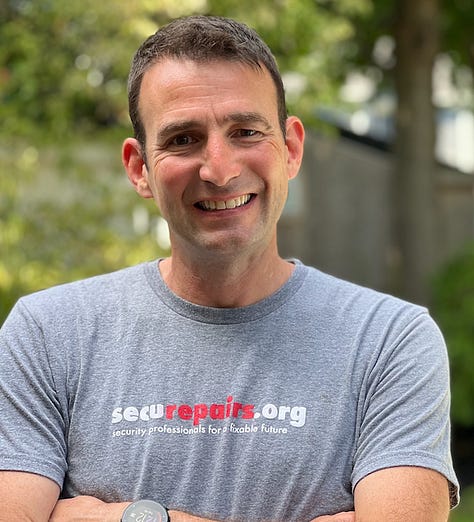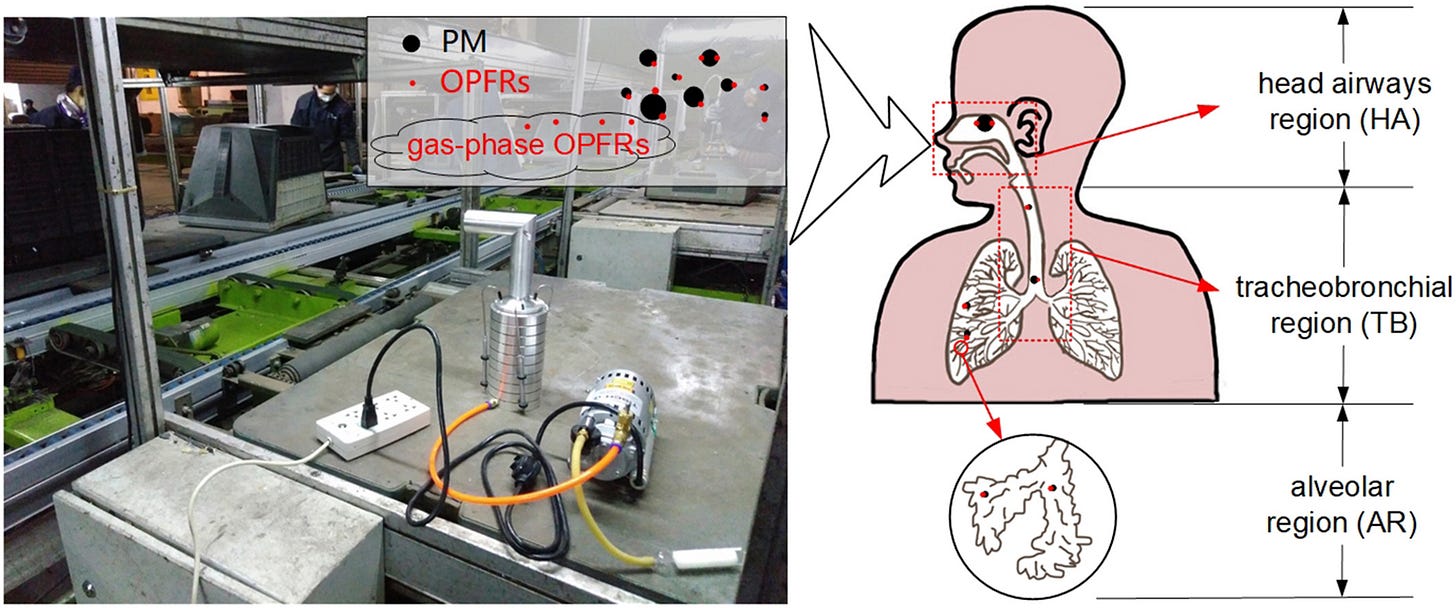At Hacker Summer Camp: What To Do About Bricked & Abandoned Stuff?
A panel at the August DEF CON hacker conference in Las Vegas will highlight the epidemic of abandonware..and a new non-profit seeking to end it. Also: BMW leans back into subscriptions.
Contents:
Big News: DEF CON takes on bricked and abandoned stuff
Other News:
BMW leans back into subscriptions
E-waste sorters exposed to dangerous chemicals
How you can use the right to repair in California
Video: Unlocking the right to repair
Circular economy commitments fall flat on curbing plastics
Gen Z supports circular economy - but at what price?
Virginia purchases augmented reality tools to train kids on repair
Video: How companies profit off unfixable devices
DOJ/FTC extend comment period on PE "roll ups" Big News
You just purchased a new smart refrigerator with lots of cool features: a touch screen interface that can display a calendar, play videos, send and receive texts and even track when your milk has gone bad or your food supplies are running low.
How long with the new fridge last? Well, if your past experiences are any indication, it should last well more than a decade - even two decades or more with proper maintenance and upkeep.
Another question: how about the software that runs the refrigerator? That's a totally different question and one that's much easier to answer: it probably be supported for around 5 to 7 years, if current industry practices are any measure. But honestly that's a guess. In the U.S., there are no requirements that manufacturers support their software for any period of time. The result: manufacturers are selling costly, software-driven "smart home" devices with the freedom to "brick" them when they no longer deem them worthy of supporting.
Spotify’s Car Thing - a sign of what’s to come
We've seen that recently, with stories about Spotify informing customers that it was bricking it's Car Thing smart device, less than two years after it began selling it to the public for hundreds of dollars. Then there was toothbrush maker Oral B, which said that it was discontinuing software support for a pricey, $230 "smart" Alexa toothbrush that was integrated with Amazon's virtual assistant and that it launched in 2020. The company’s decision effectively killed off a range of smart features, including voice recognition and AI-powered oral care advice, that convinced owners to pay a premium for it.
Expect incidents like this to get more frequent, as the population of smart, connected devices explodes in coming years - absent any clear rules or regulations that mandate support or end of life planning. The question is: what to do about it?
That’s the subject of a discussion at the DEF CON hacker conference in Las Vegas next month featuring some of the top minds in cybersecurity and consumer rights. The talk is Bricked and Abandoned: How to Keep the IoT from being an Internet of Trash, which will take place Friday, August 9 at 5:00 PM Pacific Time at DEF CON an annual cybersecurity conference in Las Vegas that is now in its 32nd year, and that’s commonly referred to as “Hacker Summer Camp.”





The panel will feature Fight to Repair Editor in Chief Paul Roberts along with an all-star cast of experts in cybersecurity, the security of connected “Internet of Things” devices and policy. Those include acclaimed science fiction writer Cory Doctorow, a Special Advisor to the Electronic Frontier Foundation and the man who coined the term “enshittification” to describe the noticeable trend of deteriorating quality and eroding consumer rights as digital transformation and the Internet of Things work their way into more and more aspects of our lives.
Joining Cory will be Chris Wysopal, aka “Weld Pond,” the co-founder and CTO of the firm Veracode and part of the celebrated, Boston-based 1990s hacker collective The L0pht. Also on the panel are Tarah Wheeler of Red Queen Dynamics and a Senior Fellow for Global Cyber Policy on the Council on Foreign Relations, and cybersecurity researcher Dennis Giese, who has done groundbreaking work exploring cybersecurity weaknesses in connected products like robot vacuums.
The discussion will focus on the growing costs of “bricked and abandoned” connected devices - from jilted consumers, to businesses and government agencies besieged by malicious botnets of hacked “end of life” broadband routers.
Conversation will also center on a new non-profit, SRFF - or the Secure Resilient Future Foundation (https://secure-resilient.org). This is a group that we’ve created to give the cybersecurity community a seat at the policy table and a foot in the door of the “room where it happens” as we work to shape a future that is free from “rent what you own” schemes, disposable technology, tech-fueled monopolies and the mountains of e-waste they generate
Premium membership for a year: $50
On that note…SRFF needs your support. With a donation of $50 or more to The Secure and Resilient Future Foundation (SRFF), you’ll a year of premium access to Fight to Repair Newsletter - a 16% discount for our annual subscription. SRFF is a nonprofit dedicated to forever burying the lie of “security through obscurity” that promotes anti-competitive, wasteful and anti-consumer business practices.
Other News
BMW leans back into subscriptions
BMW found itself in hot water last year after owners complained about the company’s pricey subscriptions to use seat warmers built into late model vehicles. In response, the company rescinded its offer of subscription-based heated seats. But it now appears the victory for car owners was short lived. BMW has since decided to test the waters on subscription features with a subscription for adaptive headlights. BMW offers subscriptions for adaptive headlights via over-the-air updates, a shift from traditional one-time purchases. That comes alongside those of other vehicle makers, including Mercedes which (in)famously offers a subscription for enhanced vehicle acceleration. Consumers have thus far been resistant to automotive subscriptions, which run against a long tradition of vehicle ownership and come amidst rising car ownership costs and a blossoming of other, non-vehicle subscription services.
E-waste Sorters Exposed to Dangerous Chemicals
A new study researching the levels of harmful chemicals called organophosphate flame retardants in the air of e-waste recycling workshops in China, showed how workers could be exposed to these chemicals by breathing the contaminated air. The research points to the direct human impacts of e-waste—before it is fully processed where it can then have even more negative environmental and health impacts.

How You Can Use Your Right to Repair in California
Simply having a right to repair doesn’t always mean much if you don’t exercise it. That’s why U.S. PIRG has outlines steps consumers can take to address companies not complying with California's Right to Repair Law, which took effect on July 1st. If you live in California, you can file a complaint with your state's attorney general, who is responsible for enforcing the law. Additionally, you can file a complaint with the Federal Trade Commission (FTC), which, while not resolving individual cases, can investigate and take action against non-compliant manufacturers based on the information provided.
You can find all the details needed to document and file a claim in PIRG’s full guide. And if you have a story about a company not complying with a right to repair law, let us know about it!
Unlocking the Right to Repair
Circular Economy Commitments Fall Flat for Curbing Plastics
A new report says that despite corporate commitments and regulatory targets, the circular economy has made little progress in the plastics industry over the past decade. Clear and consistent regulations are necessary to solve the issue, with the authors particularly emphasizing the need for the successful negotiation and introduction of the United Nations Plastic Treaty, which aims to end plastic pollution. It also suggests that regulations should support the adoption of new business models that facilitate coordination and collaboration across complex, fragmented value chains.
Gen Z supports circular economy - but at what price?
The website packagingdigest (yeah, that’s a thing) has an interesting piece on Generation Z (aka “Zoomers”) and how their priorities and desires will soon influence the world significantly, driving - among other things- a large-scale circular packaging economy given the right circumstances. The article notes that Zoomers are digital natives and better educated on sustainability and environmental issues than any previous generations, but also burdened by higher costs of living including higher rents, more debt, and less brand loyalty. There is a strong interest in reusable packaging among Gen Z, both in foodservice and consumer packaged goods (CPG) markets. While reusable packaging is being explored by many suppliers, with sustainable goals encompassing recyclable and compostable solutions alongside reusables, there are significant regulatory challenges in countries like the U.S. where complex and inconsistent state of US food packaging laws across jurisdictions pose challenges for reusable initiatives. That may add up to a dilemma for the packaging industry as it looks to balance eco-friendly practices with cost, as recycled materials are often more expensive than less sustainable options.
Virginia purchases augmented reality tools to train students to do welding, electronic vehicle repairs
Virginia schools are using a $600,000 grant from the Virginia Department of Education for Career and Technical Education (CTE) to purchase augmented reality systems to teach students welding and electronic vehicle system repair. Sixteen school divisions each received $37,500. The grants are seen as a way to support workforce development and exploration of in-demand career opportunities. Five schools are purchasing augmented reality welding systems and two for electronic vehicle systems.
How Companies Profit off Unfixable Devices (ft. Louis Rossmann)
DOJ extends deadline for comments on Private Equity serial acquisitions and roll up strategies
The U.S. Department of Justice and FTC announced that it is extending its deadline for comments on the issue of serial acquisitions and roll-up strategies by 60 days. The joint request for information (RFI) aims to understand how corporate actors, including private equity-owned businesses, grow and potentially dominate through acquisitions of smaller firms. The new deadline to submit comments is September 20. The investigation includes the consolidation of collision repair facility ownership in the U.S.







